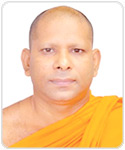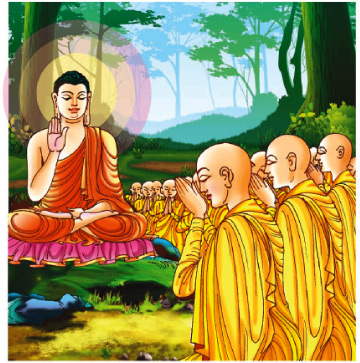The establishment of the dispensation of Bhikkhunis
on the Binara Full Moon
Day
 Senior Lecturer, Pandit, Senior Lecturer, Pandit,
Faculty of Humanities and Social Sciences
University of Sri Jayewardenepura
Dr. Ven. Dodamgoda SumanasaraThero
In the year 2022, the Binara Full Moon Day falls on the 10 th of September and
it is very important for all Buddhists around the world, especially for all
female disciples of the Buddha.
The Order of the Buddha was established by four disciples namely, monks (Bhikkhus),
nuns (Bhikkhunis), male devotees (Upasakas), and female devotees (Upasikas). Of
these females’ domain is very important for both the nuns and female devotees to
practice their spiritual activities in this mundane life to develop their
meritorious thoughts and deeds to obtain a blissful life.
In ancient India, according to the brahmins’ views and concepts, women were not
allowed to do outdoor activities and they were confined to their homes where
they had to work under their husbands or elder sons. Further, in the brahmins'
society of India women were considered female slaves.’ Further, the birth of a
girl to a family was considered a ‘curse’ for all the family. So, due to these
brahmins’ meaningless opinions, all women faced many hindrances and worries and
had to stay at home without any grace and privilege throughout their lives.
 At that time, the Buddha directly criticized the brahmins’ caste system and its
meaninglessness of dividing people into several categories of castes. The Buddha
has clearly stated in the Vasala Sutta of the Khuddaka Nikaya how one becomes an
outcast or a brahmin. Accordingly, one becomes an outcast or a brahmin due to
his or her deeds not because of his or her birth. At that time, the Buddha directly criticized the brahmins’ caste system and its
meaninglessness of dividing people into several categories of castes. The Buddha
has clearly stated in the Vasala Sutta of the Khuddaka Nikaya how one becomes an
outcast or a brahmin. Accordingly, one becomes an outcast or a brahmin due to
his or her deeds not because of his or her birth.
“Na jacca vasalo hoti –
Na jacca hoti brahmano
Kammana vasalo hoti –
Kammana hoti brahmano.”
(By birth is not one and outcast – By birth is not one a brahmin By deeds is one
an outcast – By deeds is one a brahmin.)
In Buddhist teachings, both men and women are human beings in society, but they
differ according to their inherent abilities and skills. These inherent
abilities can also be changed if someone works hard in day-to-day life.
As the great teacher, the Buddha kept the women and men in an equal place and
believed that women, like men, were wise and intelligent enough to understand
and follow the Buddha’s teaching to obtain arhathood. Since then, they have been
honored by everyone and they have equal opportunities to live in peace with
their freedom as human beings among the people of the society.
The Buddha granted admission for the women who were willing to enter the Order
of Bhikkhunis to eradicate all hindrances and suffering in their worldly lives.
Among them, the foremost female disciple of the dispensation of the nuns was the
Buddha Mata, Maha Prajapati Gotami and she was the founder of the Order of
Bhikkhunis.
Although Maha Prajapati Gotami made requests from the Buddha to be ordained at
the beginning of the Order of Bhikkhus, they were not allowed for not having
proper and sufficient protection and reasonable grounds for them at that time.
Hence, The Buddha said that “No, Gotami, do not wish for women to enter homeless
life in this doctrine and discipline.” In the meantime, Venerable Ananda made
the same request again from the Buddha on behalf of Prajapati Gotami. After
considering these appeals, the Buddha granted permission for the women to be
ordained by accepting the following Eight Great Conditions (Attha garu dhamma).
1.
A Bhikkhuni, even if she attained the higher ordination (Upasampada), 100 years
ago, should honour, and worship Buddhist monks who obtained the higher
ordination on that very day without considering their seniority.
2.
The Bhikkhunis should not observe Vas (Rainy Retreat) where there are no
Buddhist monks.
3.
Every two weeks, Bhikkhunis should take advice from the monks regarding their
disciplines/performance.
4.
Bhikkhunis should end their Vas season in the presence of the monks’ assembly.
5.
Bhikkhunis should reveal their purity in the presence of both monks and nuns.
6.
Bhikkhunis should train as novices for two years and obtain their higher
ordination in the midst of monks.
7.
For any reason, Bhikkhunis should not insult monks.
8.
Bhikkhunis should not advise the monks.
With accepting the above Eight Great Conditions Prajapati Gotami and her
followers of the five hundred princesses entered the Order of the Bhikkhynis on
the Binara Full Moon Day by respecting the great teacher, the Buddha.
Thereafter, the Order gradually grew up with the ordinations of queens,
daughters of wealthy and poor families, princesses, widows, bereaved mothers,
courtesans, helpless women, and so on. The Therigathas (Stanzas of Elder Nuns)
of the Khuddaka Nikaya clearly expresses how Arahants Bhikkunis experienced
feelings of joy by entering the Order of Bhikkhunis to practice the noble
teaching of the Buddha for eradicating all their commitments in the mundane
life.
Several years after the beginning of the Order of Bhikkhunis, with similar to
the positions of the chief disciples in the Order of Bhikkhus, Arahants Khema
and Uppalawanna were honored by the Buddha as the chief female disciples in the
Order of Bhikkhunis amidst both the monks and nuns respectfully. As well as some
of the Arahants Bhikkhunis namely, Patacara, Dhammadinna, Bhadda Kapilani, Soma,
Yashodhara, Kisa Gotami, Anopama, Subha, Jivakambavanika Subha, Dantika, Umbari,
Rohini, Ambapali, etc. were honored with the different titles due to their
specific spiritual abilities and skills they have greatly practiced.
As Buddhist monks, Bhikkhunis also delivered the discourses of the Buddha to the
Dhamma followers in different areas. They guided the people by explaining the
teachings of the Buddha to understand the reality of life to release from
diverse obstructions in worldly life.
To conclude, though the women were confined to their houses as female slaves in
the brahmin society of India, the Buddha realized that they were also
intelligent enough to engage in social work with their inherent abilities and
skills. By understanding this, the Buddha gave equal opportunities for them and
granted permission to be ordained establishing the dispensation of Bhikkhunis on
the Binara Full Moon Day. |
